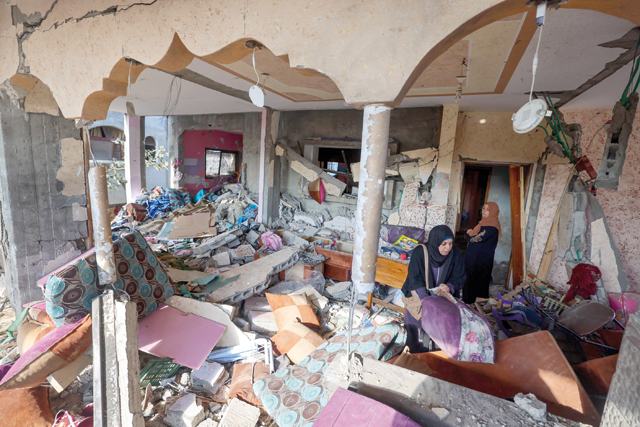GAZA STRIP — Israel bombed Gaza on Saturday as the United Nations warned the Palestinian territory has become "uninhabitable" after three months of fighting that threatens to engulf the wider region.
AFP correspondents reported Israeli strikes early Saturday on Gaza's southern city of Rafah, where hundreds of thousands of people have sought shelter from the fighting.
Civilians continue to bear the brunt of the conflict, with the UN warning of a deepening humanitarian crisis as famine looms and disease spreads.
Abu Mohammed, 60, who fled to Rafah from the central Bureij refugee camp, told AFP Gaza's future was "dark and gloomy and very difficult".
With much of the territory already reduced to rubble, UN humanitarian chief Martin Griffiths said on Friday that "Gaza has simply become uninhabitable".
The UN's children's agency warned that clashes, malnutrition and a lack of health services had created "a deadly cycle that threatens over 1.1 million children" in Gaza.
Israeli forces were continuing "to fight in all parts of the Gaza Strip, in the north, centre and south", military spokesman Daniel Hagari said late Friday.
Hagari said Israeli forces were maintaining a “very high state of readiness” near the border with Lebanon following the killing of a top Hamas commander in a strike in Beirut.
Israel has not claimed responsibility for the strike but a US defence official told AFP that Israel carried it out.
Fighting rages
AFP correspondents reported on Friday that Israeli strikes had hit the southern cities of Khan Yunis and Rafah as well as parts of central Gaza.
The Israeli forces said its forces had “struck over 100 targets” across Gaza over the previous 24 hours, including military positions, rocket launch sites and weapons depots.
The health ministry in the Hamas-run territory said it had recorded 162 deaths over the same period.
And a number of Palestinian fighters were killed in clashes in Khan Yunis, a city that has become a major battleground, the army said.
AFPTV footage on Friday showed entire families, seeking safety from the violence, arriving in Rafah in overloaded cars and on foot, pushing handcarts stacked with possessions.
“We fled Jabalia camp to Maan [in Khan Yunis] and now we are fleeing from Maan to Rafah,” said one woman who declined to give her name. “[We have] no water, no electricity and no food.”
The Palestinian Red Crescent reported renewed shelling and drone fire in the area around Al Amal hospital in Khan Yunis after seven displaced people, including a five-day-old baby, were killed while sheltering in the compound.
“We are facing a humanitarian catastrophe due to the spread of epidemics, with the hospital overcrowded with displaced people,” said a spokesman for Al Aqsa Martyrs hospital in central Gaza.
Diplomatic push
Top Western diplomats were in the region on a fresh push to raise the flow of aid into the besieged territory and calm rising tensions.
US Secretary of State Antony Blinken was in Turkey on Saturday where he was due to discuss the Gaza war with President Recep Tayyip Erdogan.
Blinken will also visit several Arab states before heading to Israel and the occupied West Bank next week.
During his visit, Blinken plans to discuss with Israeli leaders “immediate measures to increase substantially humanitarian assistance to Gaza”, State Department spokesman Matthew Miller said.
The EU’s top diplomat Josep Borrell travelled to Lebanon on Friday for talks on “all aspects of the situation in and around Gaza”, including escalating tensions with Israel.
Germany’s top diplomat Annalena Baerbock was also due to travel to the region, a foreign ministry spokesman said.
She plans to discuss “the dramatic humanitarian situation in Gaza” and tensions on the Israel-Lebanon border, spokesman Sebastian Fischer said.
The war in Gaza and almost daily exchanges of cross-border fire between Israel and Lebanon’s Iran-backed Hizbollah group since October 7 have raised fears of a wider conflagration.
Those fears grew this week following the killing of Hamas deputy leader Saleh Al Aruri this week in Hizbollah’s stronghold in the southern suburbs of Beirut.
Hizbollah leader Hassan Nasrallah warned Israel on Friday that the group would swiftly respond “on the battlefield” to Aruri’s death.
Israel’s military said on Friday its fighter jets had conducted fresh strikes against Hizbollah targets just across the border.
